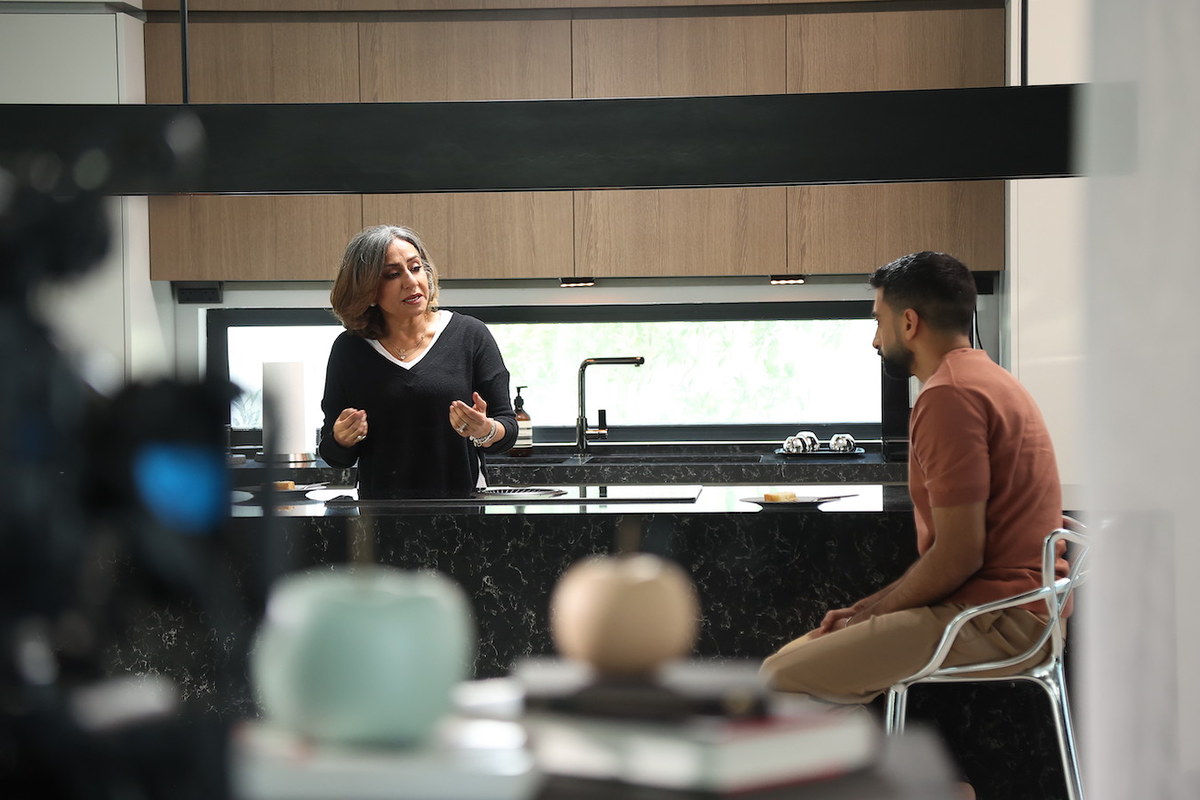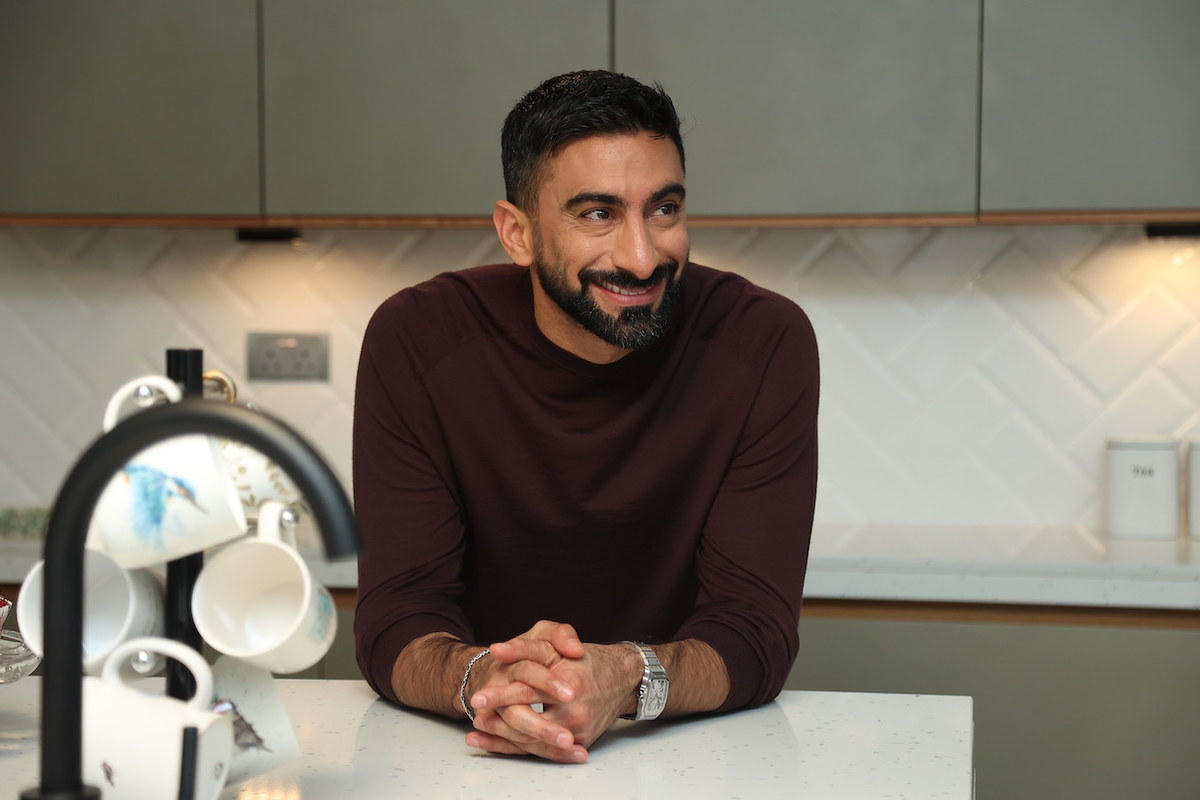DUBAI: There’s one question that Anas Bukhash, arguably the world’s top Arabic-language interviewer, never minds repeating: “What’s your relationship like with your parents?” In the years since he began sitting down with Arab world and beyond’s biggest names for his hugely popular series “#ABtalks,” it’s the one question that has always proven most revelatory, a key that has unlocked a thousand doors that have otherwise gone unopened in the short-form, shallow conversations that most celebrities are used to — the kind of conversations Bukhash has been avoiding his entire life.
“Some people have said to me, ‘Man, we’ve heard this one!’ But for me, it’s a pillar question. It’s foundational. If I know what your relationship is with your parents, I know maybe 30 percent of your entire personality. That’s a really big chunk,” Bukhash tells Arab News from behind his desk at the offices of Bukhash Brothers in Dubai.

Bukhash and his mother, Hala Kazim. (Supplied)
That, ultimately, is the secret to what has made the Emirati entrepreneur so successful, and has made viewers that were once only interested in hearing perhaps a bit more from their favorite celebrities into staunch supporters of Bukhash himself. With 1.7 million subscribers, nearly 150 million views on his YouTube channel alone, and streaming deals with Netflix, OSN, and more, “#ABTalks” is the definitive Arabic-language interview show because Bukhash is interested in humanizing his subjects in conversations that often drift well over an hour — the kind of lengthy chats that many previously thought there was no audience for in the region. They have now been proven wrong.
“Anyone can go viral these days. Fame on its own is cheap,” says Bukhash. “If I’m going be famous, I’m glad it’s for the right reasons: for instigating real conversation, for highlighting untold stories and for giving people a platform.”
There’s a reason that Bukhash knows the parent question is so useful, of course. He’s keenly aware how much of his worldview was shaped by his mother, Hala Kazim. And that relationship continues to help him grow as a man even in his early 40s. In his new series on OSN+ — “A Sitdown with Anas and Hala,” airing throughout Ramadan — he reveals that relationship to the world.

Anas Bukhash. (Supplied)
In each episode, the two sit down for a chat that almost instantly drifts onto life’s most-important and most-complex questions, with Bukhash, for instance, bringing up a quote or a story that has stuck with him from a recent reading session, and Kazim sharply cutting right to the real moral lessons that the story offers, with Bukhash listening intently before offering his own thoughts.
“Each of these episodes were recorded in basically one take. Even the production company said to me, ‘Wow, that was really quick!’ I said, ‘Yeah, there’s a reason for that. This is what we do every day. We’re always debating, discussing, challenging each other, and offering new ideas,’” Bukhash says.
Bukhash feels blessed to have such a relationship to his mother. Kazim was only 18 when she had Anas, her first-born son, a child she raised far from the UAE in Syracuse, New York.
“There were no nannies. There was no help. There was no money. There was just my father and the university, and me and my mother. When you’re forced to be with someone so much, you invest in each other. That was big, and I think that’s why, today, my mother is also my sister, my friend, and my mentor. And because of the way she has lived life, and because of who she is, she’s just naturally a life expert without a degree — always offering insights into things that catch the attention of anyone she talks to,” says Bukhash.
As Bukhash grew up, he and his mother never lost that bond they had when he was just a little boy in their upstate New York home. Even in his teenage years, at an age when many rebel against their parents, he would still hang out with his mom.
“In high school, my mother would come tell me, ‘Anas, let’s go for a drive. I want to talk,’ and off we’d go for hours. I guess it’s weird for other families to hear about this dynamic, but that’s how it’s always been. Even now, the more I become an adult, the more she sees me as a friend, and even ask me for advice on things, too,” says Bukhash.
Bukhash, a father himself, uses the word ‘become’ there not just as an accident—he knows he’s done a lot of growing as a person, and still has a lot left to do. Even though he may now be known as one of the region’s best listeners, in the early days of “#ABtalks,” he was anything but.
“In the beginning, people kept telling me, ‘Anas, listen more! Anas, don’t interrupt!’ and it wasn’t just one comment, it was many. I said to myself, ‘Ok, where there’s smoke, there’s fire,’ and I was intent on going from a crappy listener to a great listener,” says Bukhash.
Being a great listener, of course, has its disadvantages — especially when you become famous for it.
“It’s challenging because when people stop you, they expect you to be in listening mode 24/7. Even if I’m with my kids, I never mind when people say hi or ask to take a picture, but can I listen to a story for 20 minutes when my son is pulling at my hand, asking when we’re going to play? It’s tricky. I hate complaining about this because it’s also such a blessing to be able to help people, but it can be difficult to balance that with your everyday life,” he says.
Bukhash loves to listen to people though, not only because he might be able to help them, but because of how much he can learn from each person he speaks to, from any walk of life. Everyone’s experiences, their successes or failures, contain in them lessons that can help one get better, he believes.
“I’m the kind of guy who stops to ask for help from the first person I see the second I feel lost. There’s no ego with me. And because of that, I’m probably going to make it to my goal faster than the guy who refuses to ask for directions because he thinks he knows everything,” says Bukhash.
The person he asks most for directions, of course, remains his mother, who is the first to pick up the phone after each new airing of “#ABtalks,” even hundreds of episodes in.
“Every single time I get a voice note, ‘You don’t say it this way, you say it this way. Don’t use this word...’ I love it. Compliments are nice, but compliments don’t help you evolve,” he says. “And that’s what I always want to do — evolve.”












